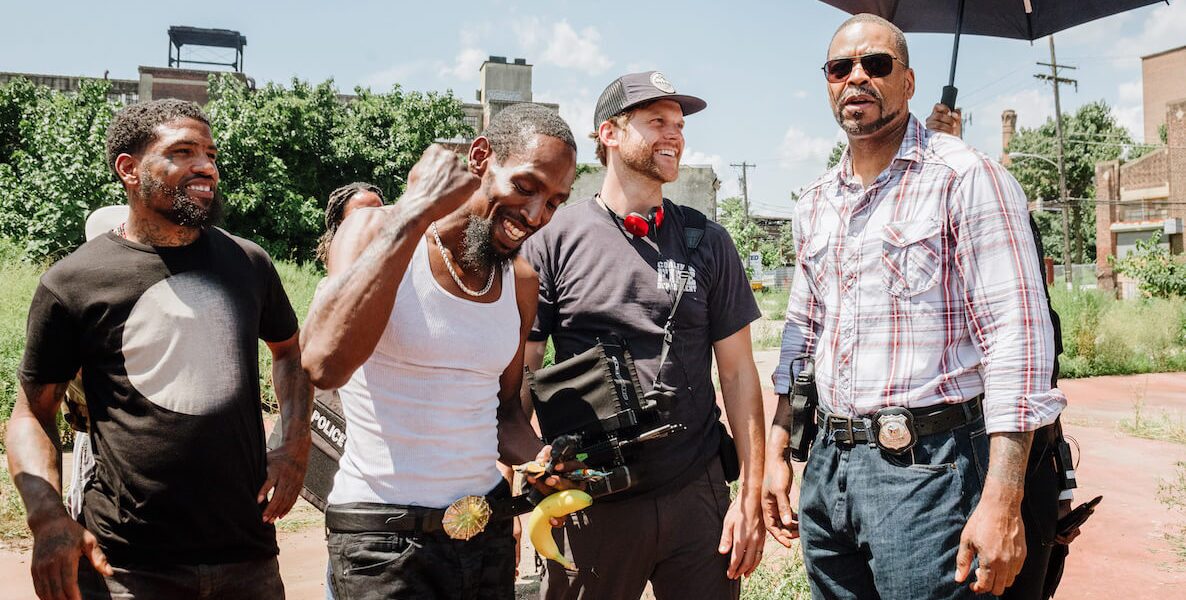There was a time, before Idris Elba called, when director Ricky Staub’s vision for his debut feature film Concrete Cowboy—about Philly’s urban riders—was to feature only real people from the North Philadelphia neighborhoods where the city’s Black cowboys live and raise their horses. That could have been incredible, Staub insists.
“But,” the co-founder of Philly-based Neighborhood Film Company, notes, “when Idris Elba wants to be in your movie, you don’t say no.”
The movie, being released Friday on Netflix, tells the story of a young boy—Stranger Things’ Caleb McLaughlin—who spends the summer in North Philly with his father (Elba), one of the cowboys trying to keep the city from shutting down the 100-year-old Fletcher Street stables. The movie reflects a sad reality: Since filming ended in 2019, the Strawberry Mansion vacant lot where Fletcher’s horses grazed for decades has been sold by the City and is being developed for affordable housing.
Staub still managed to cast several of the actual Fletcher Street cowboys and about 100 community members in his film, which is based on a book by Greg Neri. One of them is OG Law, a Philly artist and anti-violence activist, who plays Jalen, the “bad guy” in Concrete Cowboy.
OG—whose real name is Michael Ta’Bon—is best known for his Deathfasts, in which he spends several weeks in a mobile jail cell billed as Hard Knock University, dressed in an orange jail jumpsuit, sending a message to young people to choose peace, or as his movement is called, Fighting Hate With Love.
In 2015, when The Citizen first wrote about Staub, he was living and working in Brewerytown, where Neighborhood made commercials for brands like Nike, Coca Cola and Anthropologie.
Staub—along with his business partner Dan Walser—had launched a one-year apprenticeship program to train recently incarcerated people how to be producers, a skill they then carried into careers of various sorts. (They are now training their 11th apprentice.)
Staub then went on to write and direct the short film The Cage, a love story to the North Philly neighborhood he is not from, but which he wholeheartedly adores. (He now lives in Los Angeles, but Neighborhood is still based in Brewerytown.)
When The Citizen first met OG, in 2017, he was spreading his unique message of peace all over town and preparing for the third of his 70 Mile-7 Day runs to raise awareness of his mission. He has always been on the front lines, as he says; now, occasionally, he takes time out from his activism to act in Staub’s movies.
Staub refers to Law as his “Black Leo,” the Leonardo DiCaprio to his Martin Scorsese: “OG is a testament to what I love about filmmaking. He inspires me and makes me better. I need him to be around.”
The two friends joined me last week for a virtual conversation about the upcoming movie, using it to raise money and awareness for the city’s Black horse riding community, and the “heart” they recognize in each other.
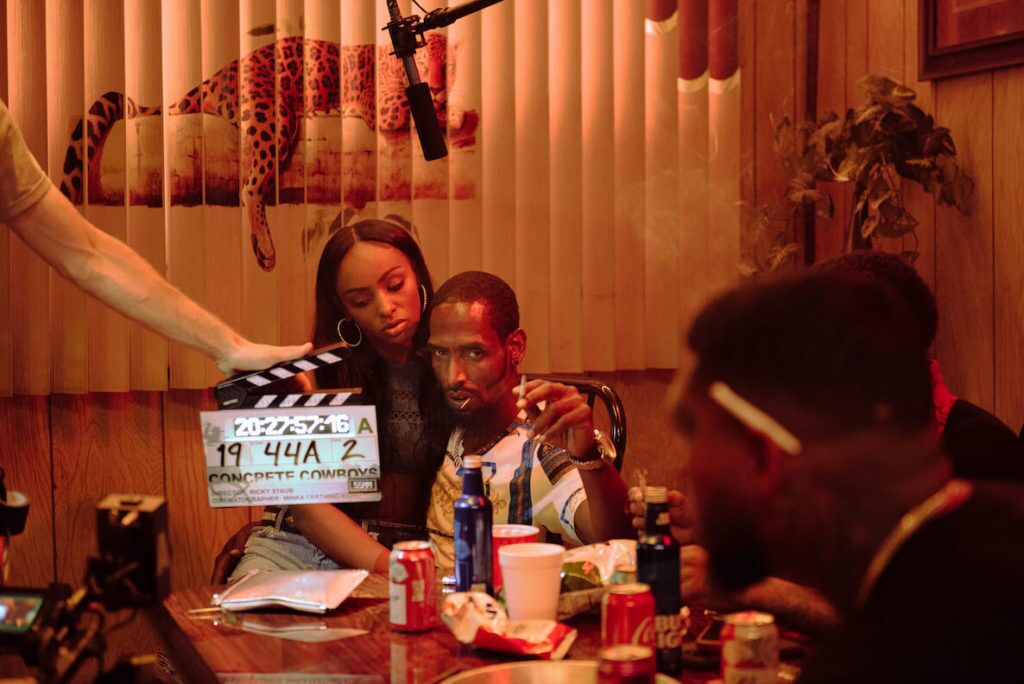
Roxanne Patel Shepelavy: First, how did you two meet?
OG Law: Through a friend of mine, Drew. Years ago he was a drug dealer in the neighborhood, and he had a lot of money. I had a video called “Rest in Peace,” one of my first. He got in the video, counting his money—the video went far because people love to see that kind of thing in my neighborhood, because we’re poor.
Ten years later, I didn’t know he got out of prison and I didn’t know he was working for Ricky [as that year’s Neighborhood apprentice]. One day I received a message from him, and he said Yo, I think you’d be perfect for this movie. You got to talk to this man Ricky, he’s been a blessing to my life. He showed his face—he was wearing glasses, looked like a businessman. I could tell he experienced something outside of our urban experience that changed his life.
Ricky called and after one conversation, he said, You got to be the voice of this film.
Ricky Staub: Andrew was our apprentice, he worked on Concrete Cowboy and The Cage. (He’s doing great—he just finished Season 2 of The Servant, with M. Night Shyamalan.)
Drew said, You need to meet OG Law, I think he’d be perfect for the dad. OG had never read a script before so he just started reading every action line, every piece of dialogue, just filled it in. It hit me: This guy is incredible. I can’t just put him in one scene. It completely reshaped and ultimately changed the whole film.
That was four years ago. From there, I feel like we talk almost every other day now. In terms of our heart for each other, and justice, we cover a lot of ground because we’re so different. It’s awesome.
“This is one of the first white men that proved to me with his character that he feels as though Black lives matter, Black history matters and, with this new horse stable being built, that Black future matters as well.”
RPS: Ricky, what was your introduction to the Fletcher Street cowboys?
RS: Where my office is [in Brewerytown], there was this huge hill, and I could see out to all these lots. This was right when I started the company. I heard the music first. I looked out and there was this guy riding a carriage that was all tripped out, it had black rims and speakers. (We tried to find it, but we couldn’t. So we recreated it for the movie.)
I ran down and talked to this gentleman who told me about Fletcher Street, and that’s when I came across Greg Neri’s book, Ghetto Cowboy. I read it and flagged that it would make a fascinating movie. But it wasn’t until 2017, when I was speaking in court for our apprenticeship, that I met Eric Miller, who had come home for about a week before and had purchased a horse, talking to a judge about how he was spending his time. I had just released The Cage and was getting a lot of attention, and people were starting to ask what do you want to do next?
I got to understand the story behind Fletcher Street and the threat of gentrification—even back in 2017, Eric was already aware the land was going to be taken from them. I got to know him and Eric’s heart was, I want to use this as a platform to raise awareness to help us preserve our community, not just Fletcher Street, but the larger Black cowboy community of Philadelphia. There used to be stables all over the city. And there are still people making it work in their backyard. It’s hard to take horses out of their hearts.
Eric and Mil [Jamil Prattis]—who plays the character of Paris, one of the leads—and me and Dan went to Fletcher Street a lot; we went to their barbecues, recorded probably 10 hours of conversations with them just inundating us with horse culture of North Philly from their perspective; went to horse auctions with them. The whole journey was pretty magical.
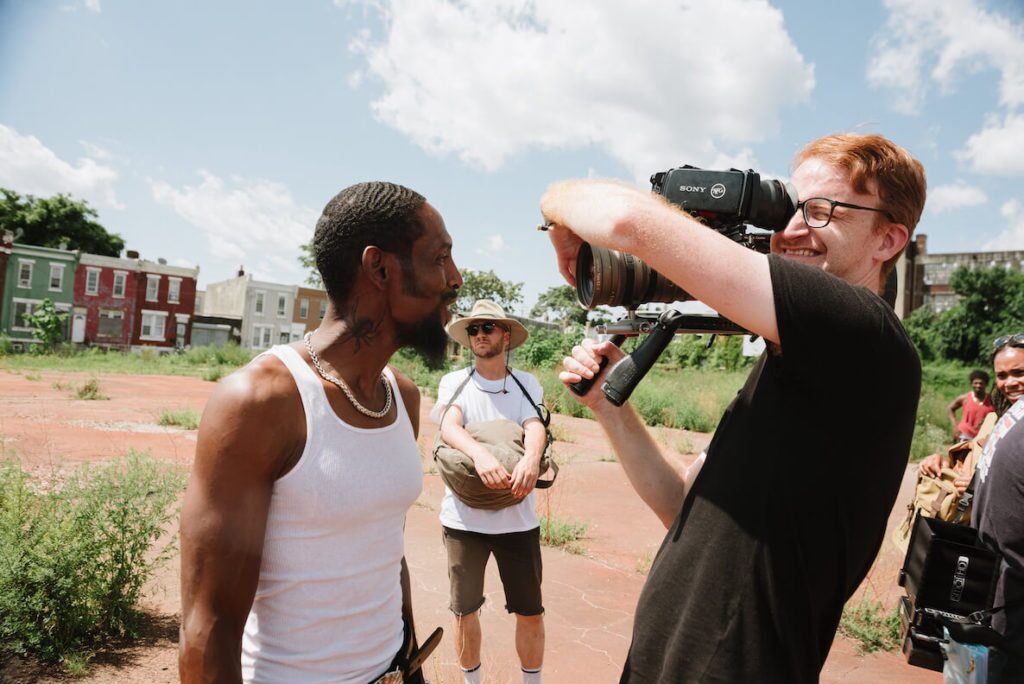
RPS: OG, did you have a connection to the Fletcher Street stables before doing the movie?
OG: My story is deeper than that. My uncle owned the karate school on 60th and Market; as well, he was the leader of the Black Cowboys Association. He owned the horticulture site, that was his stable. I grew up walking the children around who came from underprivileged backgrounds. I saw how loving a horse could transform the heart of a cold person. You got to remember, if your mom is a perc addict and your father’s in prison, you’re raising yourself or your brothers and sisters are raising yourselves, so they wildflowers.
Now with these horses, they got to look at these creatures—they got beautiful eyes and temperaments and they begin to care about the horse. If you mess with their horse, they get defensive over the horse. Now you can see they learn to care about something; now we can transform that ability to another human being.
That’s how you prevent violence. You don’t take guns away to stop killing; people killing people with knives and bows and arrows before bullets came in to play when they got hate in their heart. But you got to do what you got to get that hate out their heart. It’s like a downloaded application; you got to delete it and then you have to upload love.
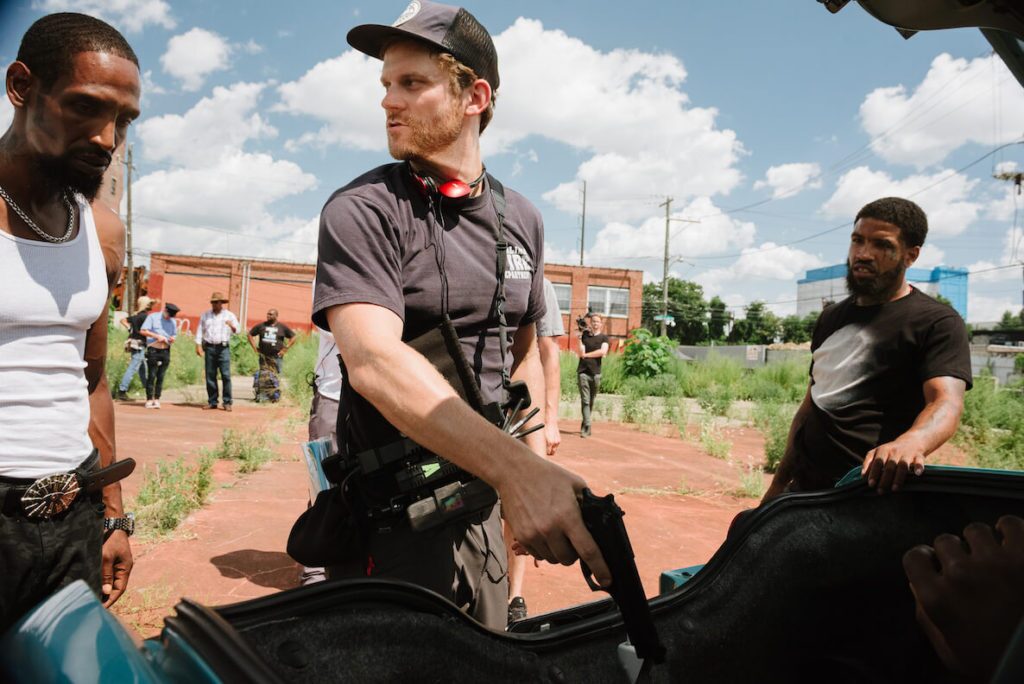
RPS: What are you doing to raise money for the stable?
RS: We established a nonprofit called Philadelphia Urban Ride Academy (PURA) because one of the issues at Fletcher Street is, while there are tons of groups doing really good work there, it’s not cohesive. We were trying to bridge a gap in the city to help grant us some land or help us preserve this heritage. Up until recently in those conversations the city has refused to help us in any way, so we’re going to raise money privately. The way I view the economy of business is, You need to be the owners. Like, you borrow anything from the government it’s just a matter of time before it’s not yours anymore. We’re working with a gentleman named Ryan Spak, who’s a developer in Philly who’s been amazing at helping us navigate these conversations.
Unfortunately, Eric Miller was murdered a week before we started prep on the movie, which was tragic. The other cowboys who were close to him have rallied to continue his legacy with the nonprofit. The executive director is one of his best friends, and she’s been incredible leading that.
We launched PURA to coincide with the release of the film on April 2nd, when actors will be on Fallon, the Today Show, pushing it. It’s going to take a while to raise $2 million, regardless. I’ve never put out a piece of content, as I’ll call the movie, that has a reach of over 200 million people worldwide. The film is going to premier in over 190 countries, in 32 languages—and that’s 200 million people who pay for the subscription. You could multiply that by 2.5—that’s 500 million people who could see this film.
“You don’t take guns away to stop killing; people killing people with knives and bows and arrows before bullets came in to play when they got hate in their heart. But you got to do what you got to get that hate out their heart. It’s like a downloaded application; you got to delete it and then you have to upload love.”
And in the end it’s very clear: The city took their land, and they’re looking for help. So if we didn’t have a portal for people to be activated, then shame on us.
The vision is to create a space that’s available and open to the community for free, the kids and anyone else, for Fletcher to be able to utilize this land for lessons, for any type of work that OG’s doing against gun violence, creating a safe space in the community for these horses. And, for once in its 100-year-history, to not have the fear that they’re going to be kicked out.
I heard stories making this movie that literally almost every other year people from the suburbs who drive by think the horses are unhealthy and call the city, and the horses get taken away, and are found to be healthy and are returned, just constant harassment.
The film sheds a ton of light on it, but what we don’t realize about Fletcher Street is they buy these horses at auction where they are going to be sold for dog food, so they’re malnourished, throw-away horses; they buy them for cheap and then rehabilitate them. So a lot of times when you see them they may look unhealthy initially, and people blame the folks at Fletcher Street when they’re giving their entire paychecks, and their hearts, to these animals…
OG: …life. Their very life. You have to understand.
What I’ve seen with my eyes, we have to help Ricky finish raising this money for this because the horses need help. It’s not just the people—the people depend on the horses to help save their lives.
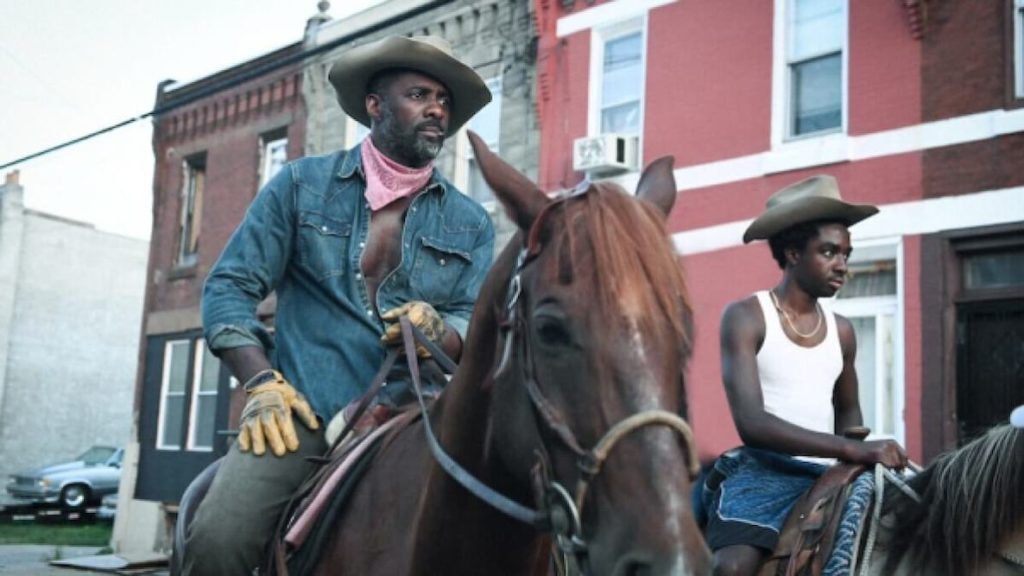
RPS: So, you got to work with Idris Elba. How did that happen?
RS: Idris and I are at the same agency (William Morris Endeavor). My agent, Rich Cook, at the time was the head of the motion picture department. He was in a larger meeting with Idris, who said that he wanted to produce and star in a film that was uplifting to the Black community. Rich pulled him aside afterwards and said he had the perfect script for him. Idris flew home to London from Los Angeles, and read the script on the plane. By the time he landed, he [and his team] decided he should produce it. After, Dan and I got on the phone with Idris—once he heard more about our company and what we wanted to do, he was totally on board. He’d also seen The Cage, and liked it, which is why he was willing to work with me as a first-time director.
Once we had Idris, we still had to get the money to do it, which was harder than you would think. We had dozens of meetings, and [Philly-born producer] Lee Daniels and [producer] Tucker Tooley were the only ones that stepped up to finance the film—in the meeting, too. We spent an hour and half with Lee and Tucker and at the end of it, Lee said We have to make this movie. His sister still lives in Philly, and had checked us out already, so they knew about Neighborhood.
RPS: And how was it to work with Idris Elba?
RS: Pretty great. [laughs] He’s fantastic. I’m very fortunate. All the filmmakers, Idris and Daniels—they were all on board with my vision to incorporate the community in a really audacious way, as they put it. I put the entire community at Fletcher Stables in the movie, many of them in speaking roles. And Idris was huge in that. From OG’s character Jalen, to casting Mil and Ivannah Mercedes, who played opposite Caleb; she grew up at Fletcher Street. They’re not actors. These are very formidable roles that are in most of the movie playing opposite Oscar-nominated, Emmy-winning actors. I believe it actually made the film better for all the other actors.
Eleven of the 14 stunt doubles were community members. And all the extras. Any scene shot at Fletcher Street were real community members. We had well over 100.
There was trepidation, but Idris was unwavering in his belief that we could do it, and we should do it that way. He was a good weapon to have.
OG: Ricky don’t understand because Ricky is not Black, he doesn’t understand the value and the authenticity that he added to the film by including the authentic Black people who live the story. Because he did that he could not lie, you understand what I mean. Hollywood lies. Before critics see the film I want critics to understand that this was the film where Ricky put his fingers on the pulse and told the real story, he told a history and and including these type of people that he included, they are not going to allow him to tell lies.
RPS: OG, what’s next for you?
OG: Next thing I’m doing is saving horses. And waiting for my next movie script.
RS: He’s not joking…
RPS: Have you continued your Deathfasts?
OG: Yes, actually, this past year was my 10-year anniversary. We were at 54th and Market in June—it was as it was placed there for a reason. I made sure none of my stores got burned down, and we filmed everything; learning from Ricky, I took my camera everywhere because I’m safe in that ‘hood because of my work. That’s when I knew utilizing celebrity with actually being on the front line was powerful. I didn’t come taking, selling anything; I came with my celebrity.
If I wasn’t popular, poppin, lit, I wouldn’t have had the power—the police would have knocked my vehicle out of the way with a tank. This movie situation made them handle me with care. All cops ain’t bad. Some people think they can join the police force and change things, and as much as I would like to disagree because of my urban background, I believe it’s going to take all of us, including the police, to get this right.
“Everyone who’s seen the film, there’s the righteous anger when you see what’s been lost. I mean I don’t paint the city as an evil empire. It’s the reality we live in in any city, but it doesn’t negate the fact that we should care about this heritage.”
RPS: Ricky, have you shown the movie to the cowboys?
RS: Ahead of the Toronto Film Festival, we had a socially distant screening for the five main cowboys that were my support team doing it. (I couldn’t be there because of Covid.) All of them said You nailed it. Of all the screenings, of all the people I’ve shown it to, I was genuinely the most nervous showing it to them, even beyond when I had to show it to Idris or Lee Daniels the first time. They’re not going to lie to me.
I’m excited for them to have this story. That was always the goal, for them to have this. The City has now taken over the pasture where they would graze the horses. It’s fenced off, they’re building affordable housing on the land. And, what a beautiful time capsule the film is now—it captured this beautiful oasis in the middle of the neighborhood.
Everyone who’s seen the film, there’s the righteous anger when you see what’s been lost. I mean I don’t paint the city as an evil empire. It’s the reality we live in in any city, but it doesn’t negate the fact that we should care about this heritage. Even if they don’t provide the dollars and cents that affordable housing provides.
OG: I want to say something that’s close to my heart: What Ricky’s doing with these horses, to raise money to create a place that could be permanent, to preserve a history that’s about to die—the movie coulda had more gun play, coulda had more action, coulda had more things that people think when they hear the word “concrete cowboy.” But what he did was, he put his fingers on the pulse of the community and told the truth, so that the history wouldn’t be altered.
This is one of the first white men that proved to me with his character that he feels as though Black lives matter, Black history matters and, with this new horse stable being built, that Black future matters as well.
This interview has been edited and condensed.
Correction: An earlier version of this piece misstated the scope of the movie. It is about the city’s Black cowboys generally, not just those at Fletcher Street.
RELATED STORIES FROM THE CITIZEN
- With the hit documentary The Social Dilemma and her latest children’s book, author, filmmaker and philanthropist Hallee Adelman continues to empower young people
- Michael Ta’Bon spends months at a time in a makeshift jail cell in public places. His message? Choose peace.
- As its commercial business has exploded, Neighborhood Film Co has taken time out for a short paean to the place Ricky Staub loves most in the world: North Philly
- Ricky Staub was on his way to becoming a Hollywood giant. So why is he in Brewerytown mentoring the recently incarcerated?
- Local film experts share 30+ of their favorite flicks to stream during the pandemic



